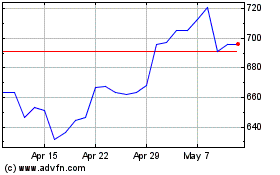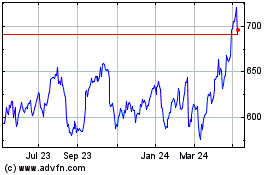HSBC Stock Hits 25-Year Low
September 21 2020 - 3:49AM
Dow Jones News
By Frances Yoon
Shares in HSBC Holdings PLC hit a 25-year low, after news
articles detailed "suspicious activity reports" filed by it and
other major banks to U.S. authorities, putting fresh pressure on a
stock that has already dropped sharply this year.
By midafternoon in Hong Kong on Monday, the bank's Hong
Kong-listed stock had fallen 3.6% to 29.80 Hong Kong dollars, the
equivalent of $3.85, after earlier trading as low as HK$29.60. HSBC
stock hasn't traded below HK$30 a share since May 1995, FactSet
shows.
BuzzFeed News, the International Consortium of Investigative
Journalists, and partner media organizations published reports on
Sunday citing documents leaked to BuzzFeed that included more than
2,100 reports filed by financial institutions with the U.S.
Treasury Department's Financial Crimes Enforcement Network.
HSBC said "all of the information provided by the ICIJ is
historical" and predated the Justice Department's conclusion in
2017 that it had met commitments under a deferred prosecution
pact.
That deal, agreed in 2012, required HSBC to fight money
laundering in exchange for putting criminal charges on hold. The
bank said it spent years overhauling its ability to fight financial
crime. "HSBC is a much safer institution than it was in 2012," it
said in a statement.
Shares in Standard Chartered PLC, which like HSBC is also listed
in both London and Hong Kong, fell 3.1% to HK$36.05. It was also
cited in the FinCEN reports. "We take our responsibility to fight
financial crime extremely seriously and have invested substantially
in our compliance programs," Standard Chartered said.
Banks and other financial firms operating in the U.S. are
required to file reports of suspicious activities involving their
clients to FinCEN when they suspect fraud, money laundering or
other potentially illegal activity. Filing such reports doesn't
automatically mean that banks engaged in or facilitated any
wrongdoing.
Shares in HSBC and many other banks have tumbled this year, as
the coronavirus pandemic has wreaked economic damage and forced
central banks to slash interest rates, which tends to damage banks'
profits.
HSBC shares have more than halved, as has stock in counterparts
Wells Fargo & Co., Spain's Banco Santander SA and France's
Société Générale SA. HSBC had a market value of about $80 billion
as of Friday's close, according to FactSet.
There is little sign of alarm about HSBC in the credit markets.
The annual cost of insuring $10 million of HSBC debt against
default was $67,000 as of Thursday, according to
credit-default-swap prices tracked by Markit. That is down from a
peak of $125,000 in March and considerably lower than CDS prices on
several continental European banks.
Last month, HSBC said net profit plummeted 96% to $192 million
in the second quarter as the impact of the pandemic complicated its
efforts to refocus on Asia while dealing with rising U.S.-China
political tensions.
In March, the Bank of England directed HSBC and other banks to
cancel 2019 dividends to shore up their capital buffers. The move
angered some smaller investors in Hong Kong who held the stock
largely for regular dividend income.
Yifan Wang contributed to this article.
Write to Frances Yoon at frances.yoon@wsj.com
(END) Dow Jones Newswires
September 21, 2020 03:34 ET (07:34 GMT)
Copyright (c) 2020 Dow Jones & Company, Inc.
Hsbc (LSE:HSBA)
Historical Stock Chart
From Mar 2024 to Apr 2024

Hsbc (LSE:HSBA)
Historical Stock Chart
From Apr 2023 to Apr 2024
